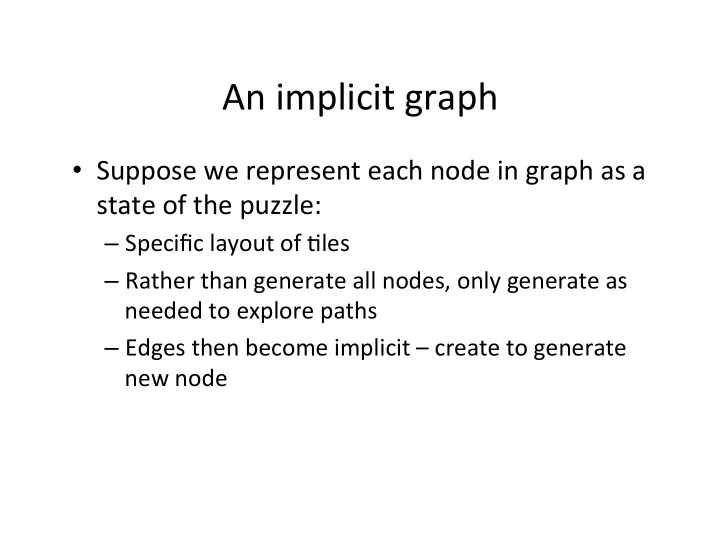

An ¡implicit ¡graph ¡ • Suppose ¡we ¡represent ¡each ¡node ¡in ¡graph ¡as ¡a ¡ state ¡of ¡the ¡puzzle: ¡ – Specific ¡layout ¡of ¡:les ¡ – Rather ¡than ¡generate ¡all ¡nodes, ¡only ¡generate ¡as ¡ needed ¡to ¡explore ¡paths ¡ – Edges ¡then ¡become ¡implicit ¡– ¡create ¡to ¡generate ¡ new ¡node ¡
A ¡node ¡ • Convert ¡sequence ¡of ¡:les ¡into ¡ 1 ¡ 2 ¡ 5 ¡ a ¡string ¡of ¡labels ¡– ¡use ¡to ¡ represent ¡a ¡node ¡ 6 ¡ 3 ¡ 8 ¡ – Example: ¡125638047 ¡ • Keep ¡track ¡of ¡blank ¡:le ¡ 4 ¡ 7 ¡ – In ¡slot ¡6 ¡in ¡example ¡ • Need ¡a ¡way ¡to ¡encode ¡edges ¡
An ¡“edge” ¡ • Need ¡to ¡encode ¡legal ¡shiSs ¡ 1 ¡ 2 ¡ 5 ¡ – In ¡example, ¡:le ¡in ¡3 rd ¡spot ¡can ¡ shiS ¡down ¡to ¡6 th ¡spot ¡ 6 ¡ 3 ¡ 8 ¡ – And ¡:le ¡in ¡7 th ¡spot ¡can ¡shiS ¡leS ¡ to ¡6 th ¡spot ¡ • Could ¡keep ¡track ¡of ¡these ¡legal ¡ 4 ¡ 7 ¡ shiSs ¡in ¡a ¡dic:onary ¡ – Index ¡by ¡loca:on ¡in ¡grid ¡ – Return ¡legal ¡new ¡loca:ons ¡
An ¡implementa:on: ¡node ¡ class puzzle(object): � def __init__(self, order): � self.label = order � for index in range(9): � if order[index] == '0': � self.spot = index � � � � return None � def transition(self, to): � label = self.label � blankLocation = self.spot � newBlankLabel = str(label[to]) � newLabel = '' � for i in range(9): � if i == to: � newLabel += '0' � elif i == blankLocation: � newLabel += newBlankLabel � else: � newLabel += str(label[i]) � return puzzle(newLabel) � def __str__(self): � return self.label �
An ¡implementa:on: ¡implicit ¡edges ¡ shiftDict = {} � shiftDict[0] = [1, 3] � 1 ¡ 2 ¡ shiftDict[1] = [0, 2, 4] � shiftDict[2] = [1, 5] � shiftDict[3] = [0, 4, 6] � 3 ¡ 4 ¡ 5 ¡ shiftDict[4] = [1, 3, 5, 7] � shiftDict[5] = [2, 4, 8] � 6 ¡ 7 ¡ 8 ¡ shiftDict[6] = [3, 7] � shiftDict[7] = [4, 6, 8] � shiftDict[8] = [5, 7] �
An ¡implementa:on: ¡search ¡ def BFSWithGenerator(start, end, q = []): � initPath = [start] � q.append(initPath) � while len(q) != 0: � tmpPath = q.pop(0) � lastNode = tmpPath[len(tmpPath) - 1] � if lastNode.label == end.label: � return tmpPath � for shift in shiftDict[lastNode.spot]: � new = lastNode.transition(shift) � if notInPath(new, tmpPath): � newPath = tmpPath + [new] � q.append(newPath) � return None � ¡
Checking ¡for ¡loops ¡ � def notInPath(node, path): � for elt in path: � if node.label == elt.label: � return False � return True � ¡
An ¡implementa:on: ¡search ¡ def DFSWithGenerator(start, end, stack = []): � initPath = [start] � stack.insert(0, initPath) � while len(stack)!= 0: � tmpPath = stack.pop(0) � lastNode = tmpPath[len(tmpPath) - 1] � if lastNode.label == end.label: � return tmpPath � for shift in shiftDict[lastNode.spot]: � new = lastNode.transition(shift) � if notInPath(new, tmpPath): #avoid cycles � newPath = tmpPath + [new] � stack.insert(0, newPath) � return None �
Searching ¡for ¡a ¡puzzle ¡solu:on ¡ • Running ¡the ¡breadth ¡first ¡search ¡finds ¡a ¡ solu:on ¡with ¡8 ¡moves ¡ – Searches ¡220 ¡nodes ¡ • Running ¡the ¡depth ¡first ¡search ¡takes ¡a ¡very ¡ long ¡:me!! ¡(and ¡runs ¡out ¡of ¡memory ¡on ¡my ¡ machine!!) ¡
Recommend
More recommend